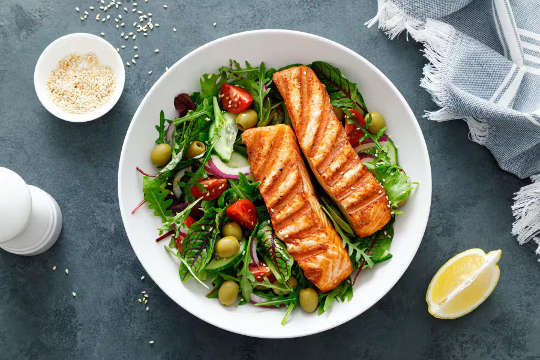
Most of us are eager to avoid getting sick this time of year. baranq/ Shutterstock
Every day we are exposed to a wide array of potentially harmful microorganisms – such as colds, the flu and even COVID. But our immune system – a network of intricate pathways within our body – helps protect us against these microorganisms and other potential diseases. Essentially, it recognises foreign invaders, such as viruses and bacteria, and takes immediate action to defend us.
Humans have two types of immunity: innate and adaptive. Innate immunity is the body’s first-line of defence, primarily consisting of physical barriers (such as skin), and secretions – including mucus, stomach acid and enzymes in saliva and sweat which prevent microorganisms getting inside the body. It also consists of cells that attack all foreign invaders entering the body.
Adaptive immunity is a system that learns to recognise a pathogen. It’s regulated by cells and organs in our body such as the spleen, thymus, bone marrow and lymph nodes. When a foreign substance enters the body, these cells and organs create antibodies and multiply the immune cells specific to that harmful substance in order to attack and destroy it. They also remember the pathogen for future reference.
There are many things we can do to support our immune system and even improve its function. Simple changes to your diet and lifestyle can all play a big role in helping you avoid getting sick.
Get The Latest By Email
We are what we eat
The nutrients we get from the foods in our diet play key roles in both building and maintaining our immune system.
Take for example the amino acid arginine. This is essential for generating nitric oxide within immune cells, which is an important defence molecule against organisms. Vitamin A and zinc are crucial in the rapid reproduction of immune cells. Vitamin C contributes to immune defence by supporting the cell functions of both immune systems. Similarly, vitamin E has been shown to enhance immune responses in animals and humans and to provide protection against several infectious diseases, such as flu, COVID and the common cold.
A varied diet including fruits and vegetables, wholegrains, nuts, seeds, dairy products, as well as fish, meat, or plant protein alternatives, will all contain these key nutrients which support our immune health.
The vast combination of microorganisms that live in our gut – known as our microbiome – also have significant effects on our health and wellbeing, despite their tiny size. In fact, the microbiome is often referred to as the “second brain” due to the extensive relationship it has with the body’s organs and systems.
One particular role the microbes in our gut play is supporting immune function. They help to control inflammation, the process the immune system uses to protect us from harmful pathogens. Ensuring the microbiome is healthy can improve immune function.

The Mediterranean diet can help support the microbiome. Sea Wave/ Shutterstock
There are many ways we can support our microbiome through the foods we eat. For example, research has shown a Mediterranean diet, which is rich in vitamins, minerals and dietary fibre, has an anti-inflammatory effect in the gut, which can help boost the body’s immune function.
This effect may be explained by a strain of bacteria known as Faecalibacterium prausnitzii which is key to immune regulation. This bacteria tends to be low in the western diet but abundant in the Mediterranean diet. You should also avoid too many refined cereals, sugars and animal fats, which can all heighten inflammation in the body which weakens the immune response.
Probiotics (supplementary blends of live bacteria) may also have benefits. Research has even shown a probiotic blend of bacterial strains Lactiplantibacillus plantarumand and Pediococcus acidilactici reduced the amount of virus detected in the nose and lungs, as well as the duration of symptoms, in COVID patients.
Living a healthy lifestyle
Your lifestyle can also have a big affect on immune function.
For example, smoking affects both innate and adaptive immunity, causing it to both overreact to pathogens and lower it’s immunity defences. Alcohol has also been shown to increase susceptibility to both bacterial and viral infections. It does this by altering the way our immune system defends against infections. Even moderate drinkers may have lower immunity.
Sleep is also crucial for maintaining immune function. Studies show that frequent, poor sleep causes inflammation in the body. This may worsen immune response, increasing infection risk and worsening infections. Adolescents who only get around six hours of sleep are also more likely to suffer from common illnesses, such as cold, flu and gastroenteritis.
Stress is another factor known to have a large impact on the immune system. It isn’t just chronic stress that suppresses the immune system either – even brief periods of stress (such as an exam) can worsen immune function. Fortunately, mindfulness meditation (which can help manage stress) may be beneficial for the immune system – though it isn’t entirely clear yet why.
Exercise has also been shown to affect immune function, with research showing moderate-intensity physical activity in particular (such as a brisk walk or ballroom dancing) can improve immune response. However, it’s important to strike the right balance as long, intense exercise without sufficient rest between workouts can actually worsen immune function and make you more likely to catch an infection. And according to some data, this decrease can happen after only 90 minutes of moderate- to high-intensity physical activity.
Of course, vaccination remains the best way to prevent infection from many common diseases, such as the flu. But a good diet and lifestyle – alongside other preventative measures, such as washing your hands or wearing a face mask – help support your immune system and the effectiveness of vaccines.
![]()
About the Authors
Samuel J. White, Senior Lecturer in Genetic Immunology, Nottingham Trent University and Philippe B. Wilson, Professor of One Health, Nottingham Trent University
This article is republished from The Conversation under a Creative Commons license. Read the original article.
books_health








